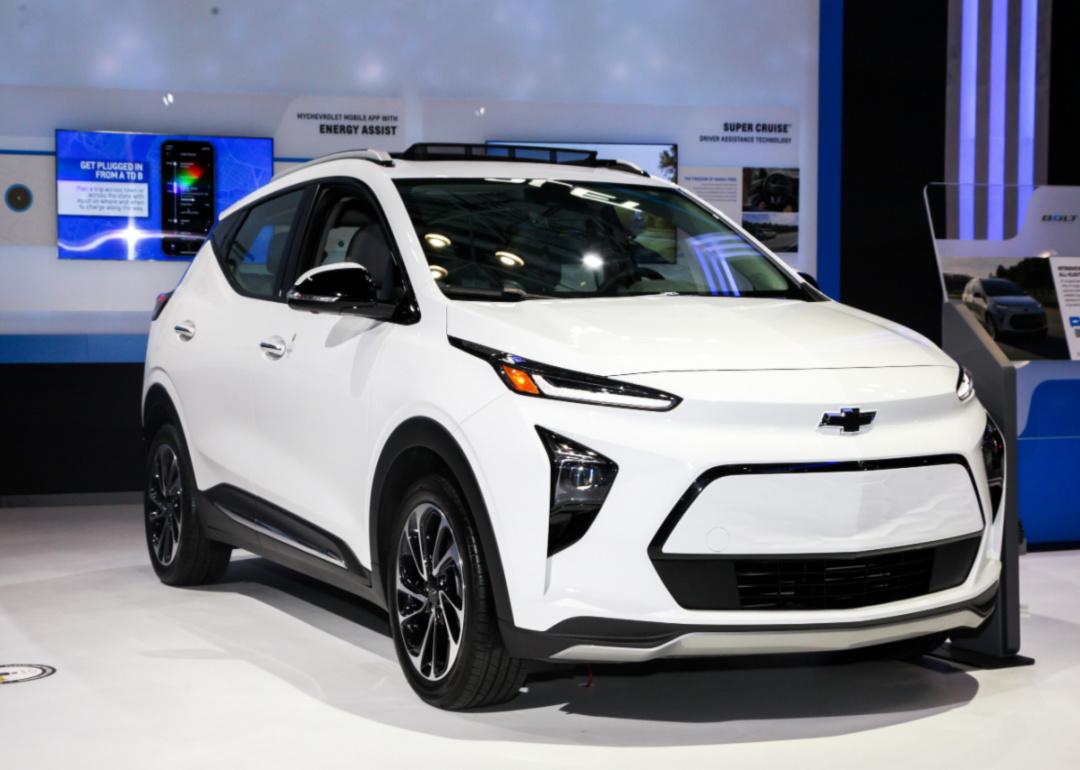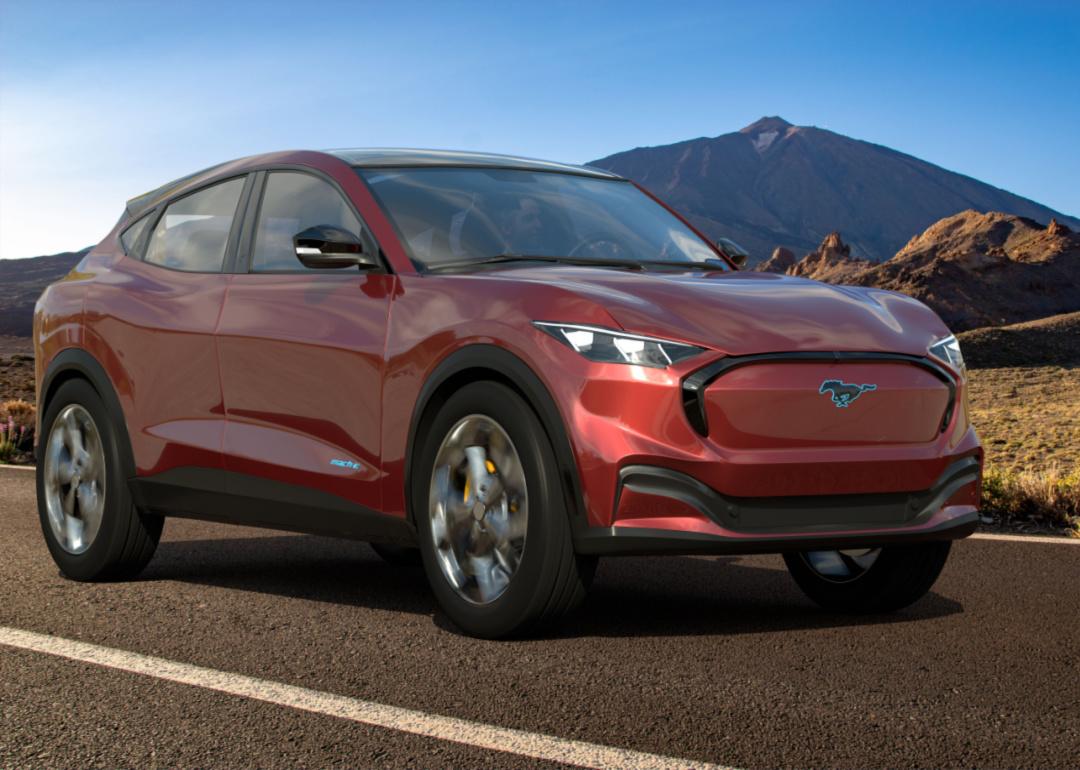
Photo by Miro Vrlik // Shutterstock
5 electric cars with the highest trade-in values
A white Chevrolet Bolt EUV on display in a showroom.
Electric vehicles (EVs) are becoming increasingly popular. According to Car and Driver and industry reports, nearly 5% of new car sales in the US are now gas-guzzling vehicles. While this might not seem significant, the first three months of 2022 saw a 60% increase in new electric vehicle registrations. These latest forms of transportation are literally on the move. It all adds up to a conversation about electric cars with the highest trade-in values.
Trade-in values, sometimes known as depreciation or resale value, matter from two perspectives. As the name suggests, trade-in value is important when it’s time to trade in another car. The higher the trade-in value of an old vehicle, the lower the out-of-pocket costs or loan amount for the new ride. On the other hand, a higher trade-in value (or lower depreciation) translates into higher expenses for a used car buyer.
Given the rapid rise of electric vehicles on the market, CoPilot compiled a list of electric cars with the highest trade-in values using data from its car-buying app.
![]()

Mike Mareen Shutterstock
Top 5 electric cars with highest trade-in values
A blue Audi eTron Sportsback drives on the desert road.
As with conventionally powered automobiles, some electric vehicles hold their value better than others. Forbes analyzed data from Edmunds and KBB to estimate the top electric vehicles by retained value. The analysis looked at the basic cuts of these models; newer electric vehicles with little or no market history are excluded from the findings. Any price quoted excludes destination charges, dealer fees and applicable tax rebates.
Chevrolet Bolt EUV
Estimated value (after 5 years): 66%
An EV doesn’t have to be expensive to hold its value, and the Chevrolet Bolt EUV is the perfect example. It’s a compact five-door hatchback that offers a respectable range of up to 247 miles and a low starting price of $27,800.
Chevrolet Bolt EV
Estimated value (after 5 years): 55%
Chevy’s cheapest electric car, the Bolt EV (starting at $26,500), offers impressive range (up to 259 miles) and performance (0-60 mph in 6.5 seconds). Its retained value also exceeds what the average petrol vehicle is worth (49.1%) after five years.
Ford Mustang Mach-E
Estimated value (after 5 years): 52%
Although it shares nothing but a name with the world’s best-selling sports car, the Mustang Mach-E crossover has been a resounding success for Ford. It can’t make them fast enough, as new orders easily require a four to six month wait. But customers don’t mind being patient with an EV (Mach-E GT) that can hit 60 mph from a standstill in 3.8 seconds.
Audi e-tron Sportback
Estimated value (after 5 years): 49%
Forking out $74,000 (or more) for an Audi e-tron Sportback has at least one upside, one of the lowest depreciation rates in the EV market. This throwback crossover carries forward Audi’s traditional luxury touches and promises 225 miles of range.
Audi e-tron
Estimated value (after 5 years): 47%
The Audi e-tron is the more conventional version of the e-tron Sportback. As such, it gets extra cargo space and a lower price ($70,800). Except for a unique grille and a few other touches, it’s easy to mistake the e-tron for the brand’s slightly smaller, gas-powered Q5 crossover. Audi uses the “e-tron” moniker on all of its electric vehicles, further blurring the company’s all-electric offerings.

Mike Mareen // Shutterstock
Other factors: Electric cars with higher trade-in values
A red Ford Mustang Mach-E drives down a long, winding road.
While knowing the top EVs with the best trade-in values is helpful, many facets of today’s auto business can change these details.
Market volatility
The US auto market has yet to return to pre-pandemic conditions. In the US, consumers bought nearly 14 million new vehicles in 2022, a 7.8% decrease from 2021. This compares to sales figures from the previous decade, when it was considered a successful year in moving from 16 million to 17 million new cars.
In other words, new car supplies remain tight, making used cars (and trade-ins) more valuable. That’s good news for those with a trade-in, but not for used car buyers.
According to CarGurus, the average selling price of a used car in mid-January 2023 was $28,785, down significantly from the record $31,775 in July 2022. But the typical used car buyer in early March 2020 (before COVID-19 hit the US). ) paid only $21,113.
There’s plenty of room for used car prices (and trade-in values) to drop, but no one can say if and by how much this will continue to happen.
The Tesla effect
Mentioning electric vehicles without referencing Tesla is hard to do. The electric vehicle giant gets credit for accelerating the electric vehicle revolution with the introduction of the sleek Model S sedan in 2012 (Tesla also produced a few thousand electric roadsters). Over the years, the company introduced the more affordable Model 3 sedan and Model Y SUV and raised prices in response to strong demand. Moves that helped keep Tesla’s exchange values strong.
But times change; Tesla’s dominance is waning. The company had nearly 80% of the electric vehicle market in 2020. That dropped to 65% two years later as major automakers including Ford, General Motors and Volkswagen offer competitive electric vehicles.
In early January 2023, Tesla announced significant price cuts of up to 20% in response to slower sales and a sinking inventory valuation. This price change also makes some Tesla models eligible for new federal electric vehicle tax credits (see below). It remains to be seen how the revised retail prices of the new Teslas will change trade-in values, but it’s a safe bet that it won’t go up. At the same time, used Teslas with worse depreciation could affect the valuations of other electric vehicle exchanges.
Tax discounts
Adding another wrinkle to EV trade-in values is the rollout of federal tax credits for refurbished EVs under the recently passed Inflation Reduction Act. Qualifying new electric vehicles (which involves a complex formula of manufacturing location and material sourcing) are eligible for a federal tax credit of up to $7,500 that can be applied to the dealer purchase price (the old way was file a tax return and wait for the credit).
For the first time, used electric vehicles are eligible for a 30% tax rebate of up to $4,000 (on pre-owned electrics at least two years old and selling for less than $25,000). All this means great uncertainty about how these subsidies will affect the valuations of electric vehicles.
This story originally appeared CoPilot and has been independently reviewed to meet journalistic standards.


